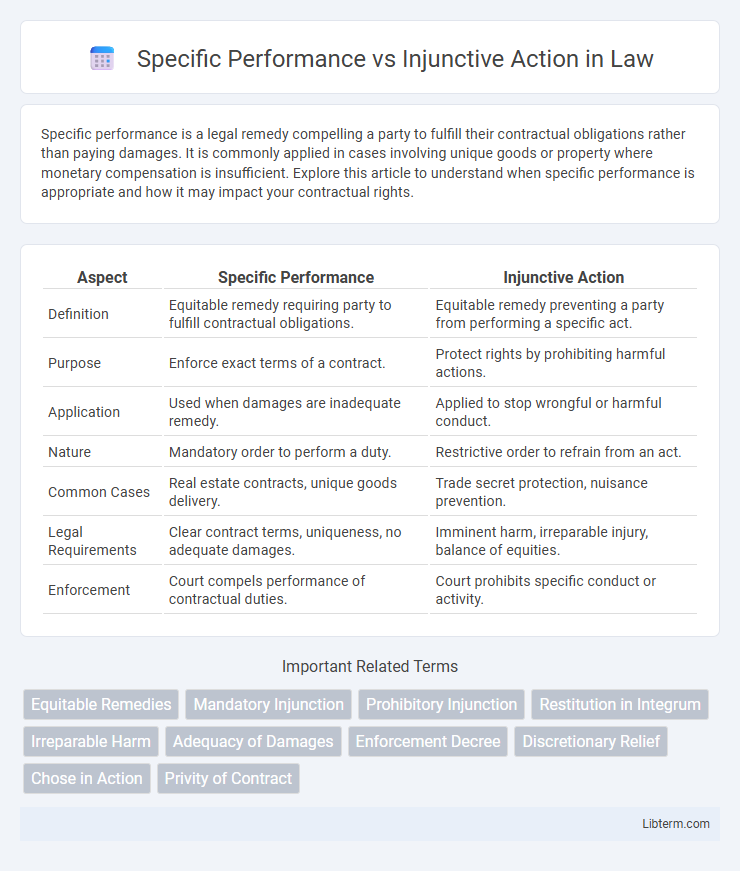Specific performance is a legal remedy compelling a party to fulfill their contractual obligations rather than paying damages. It is commonly applied in cases involving unique goods or property where monetary compensation is insufficient. Explore this article to understand when specific performance is appropriate and how it may impact your contractual rights.
Table of Comparison
| Aspect | Specific Performance | Injunctive Action |
|---|---|---|
| Definition | Equitable remedy requiring party to fulfill contractual obligations. | Equitable remedy preventing a party from performing a specific act. |
| Purpose | Enforce exact terms of a contract. | Protect rights by prohibiting harmful actions. |
| Application | Used when damages are inadequate remedy. | Applied to stop wrongful or harmful conduct. |
| Nature | Mandatory order to perform a duty. | Restrictive order to refrain from an act. |
| Common Cases | Real estate contracts, unique goods delivery. | Trade secret protection, nuisance prevention. |
| Legal Requirements | Clear contract terms, uniqueness, no adequate damages. | Imminent harm, irreparable injury, balance of equities. |
| Enforcement | Court compels performance of contractual duties. | Court prohibits specific conduct or activity. |
Understanding Specific Performance: A Legal Overview
Specific performance is a legal remedy compelling a party to fulfill their contractual obligations exactly as agreed, often used in cases involving unique goods or real estate where monetary damages are inadequate. Courts grant specific performance when the subject matter is rare or irreplaceable, ensuring the injured party receives the precise benefit promised in the contract. This remedy is contrasted with injunctive action, which aims to prevent a party from engaging in certain conduct rather than enforcing contract terms.
What is an Injunctive Action?
An injunctive action is a court order requiring a party to do or refrain from doing specific acts to prevent harm or maintain the status quo. It serves as an equitable remedy designed to stop ongoing or threatened wrongful conduct that cannot be adequately remedied by monetary damages alone. Unlike specific performance, which compels the fulfillment of contractual obligations, injunctive actions primarily focus on prohibiting harmful behavior or preserving legal rights.
Key Differences Between Specific Performance and Injunctive Action
Specific performance compels a party to fulfill their contractual obligations, whereas injunctive action prevents or mandates certain behavior to avoid harm. Specific performance is typically applied in contracts involving unique goods or property, while injunctions address ongoing or anticipated wrongful acts. Enforcement of specific performance results in an order to complete a transaction, whereas injunctive relief regulates conduct to maintain the status quo or prevent future harm.
Legal Requirements for Specific Performance
Specific performance requires a valid contract, clear terms, and the inadequacy of monetary damages as a remedy, making it a discretionary equitable remedy in contract law. Courts demand certainty of contract terms and the ability to enforce the order without ongoing supervision before granting specific performance. Unlike injunctive relief, which prevents actions, specific performance compels parties to fulfill contractual obligations based on legal standards of fairness and feasibility.
Legal Grounds for Granting Injunctive Relief
Injunctive relief is granted when legal remedies such as monetary damages are inadequate to prevent irreparable harm, often requiring proof of imminent injury and lack of alternative remedies. Courts consider the balance of equities and public interest to determine whether to issue an injunction, emphasizing the necessity to maintain the status quo. Unlike specific performance, which enforces contract obligations, injunctive actions primarily restrain or compel behavior to prevent ongoing or future harm.
Typical Scenarios for Specific Performance
Typical scenarios for specific performance include real estate transactions where the property is unique and monetary damages are inadequate. Contracts involving rare goods, such as custom-made items or art pieces, often prompt courts to order specific performance. This remedy ensures the exact terms of a contract are fulfilled when no suitable substitute exists.
Common Situations Requiring Injunctive Actions
Common situations requiring injunctive actions include preventing ongoing breaches of contract, stopping infringement of intellectual property rights, and halting activities causing environmental harm. Injunctive relief is often sought when monetary damages are insufficient to address harm, such as in cases of property disputes or unauthorized use of trade secrets. Courts grant injunctions to maintain the status quo or prevent irreparable damage, making them critical in scenarios requiring immediate intervention.
Advantages and Limitations of Specific Performance
Specific performance ensures the fulfillment of contractual obligations, offering a precise remedy when monetary damages are inadequate, especially in unique property or rare goods contracts. It provides certainty and fairness by compelling parties to perform as agreed, but courts impose limitations due to its equitable nature, including discretion based on hardship or impracticality. The remedy is less effective when continuous supervision is required or when contracts involve personal services, as courts avoid enforcing involuntary performances.
Pros and Cons of Seeking Injunctive Relief
Seeking injunctive relief offers the advantage of quickly preventing ongoing or imminent harm, preserving the status quo while a case is adjudicated. However, injunctive actions often require a high burden of proof to demonstrate irreparable damage and lack effectiveness if permanent resolution is needed. Risks include potential misuse to enforce unfair practices and challenges in enforcement, making injunctive relief both powerful and limited depending on the case circumstances.
Choosing the Right Remedy: Factors to Consider
Choosing between specific performance and injunctive action depends on the nature of the breach and the uniqueness of the subject matter involved in the contract. Specific performance is favored when monetary damages are insufficient, especially in cases involving real estate or rare goods, while injunctive relief is effective to prevent ongoing or imminent wrongful acts that cause irreparable harm. Courts evaluate factors such as feasibility of enforcement, adequacy of legal remedies, and potential impact on third parties when determining the appropriate equitable remedy.
Specific Performance Infographic

 libterm.com
libterm.com